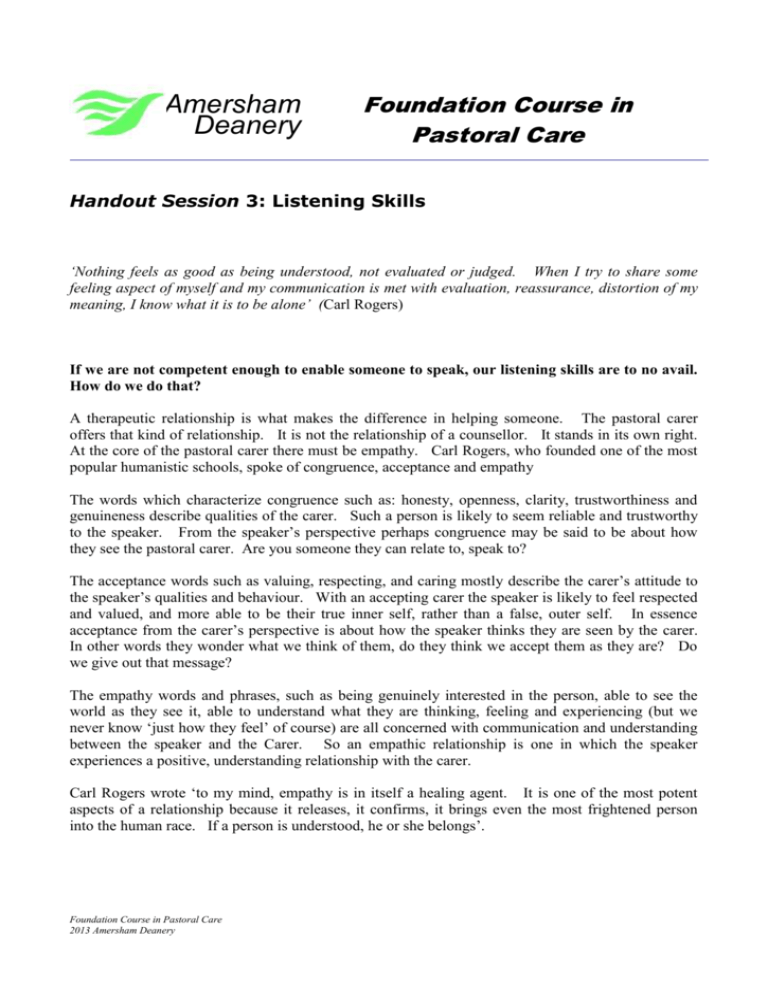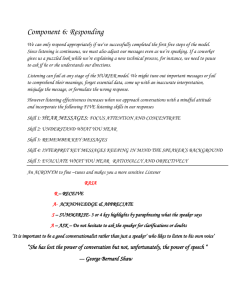Listening - Amersham Deanery
advertisement

Amersham Deanery Foundation Course in Pastoral Care Handout Session 3: Listening Skills ‘Nothing feels as good as being understood, not evaluated or judged. When I try to share some feeling aspect of myself and my communication is met with evaluation, reassurance, distortion of my meaning, I know what it is to be alone’ (Carl Rogers) If we are not competent enough to enable someone to speak, our listening skills are to no avail. How do we do that? A therapeutic relationship is what makes the difference in helping someone. The pastoral carer offers that kind of relationship. It is not the relationship of a counsellor. It stands in its own right. At the core of the pastoral carer there must be empathy. Carl Rogers, who founded one of the most popular humanistic schools, spoke of congruence, acceptance and empathy The words which characterize congruence such as: honesty, openness, clarity, trustworthiness and genuineness describe qualities of the carer. Such a person is likely to seem reliable and trustworthy to the speaker. From the speaker’s perspective perhaps congruence may be said to be about how they see the pastoral carer. Are you someone they can relate to, speak to? The acceptance words such as valuing, respecting, and caring mostly describe the carer’s attitude to the speaker’s qualities and behaviour. With an accepting carer the speaker is likely to feel respected and valued, and more able to be their true inner self, rather than a false, outer self. In essence acceptance from the carer’s perspective is about how the speaker thinks they are seen by the carer. In other words they wonder what we think of them, do they think we accept them as they are? Do we give out that message? The empathy words and phrases, such as being genuinely interested in the person, able to see the world as they see it, able to understand what they are thinking, feeling and experiencing (but we never know ‘just how they feel’ of course) are all concerned with communication and understanding between the speaker and the Carer. So an empathic relationship is one in which the speaker experiences a positive, understanding relationship with the carer. Carl Rogers wrote ‘to my mind, empathy is in itself a healing agent. It is one of the most potent aspects of a relationship because it releases, it confirms, it brings even the most frightened person into the human race. If a person is understood, he or she belongs’. Foundation Course in Pastoral Care 2013 Amersham Deanery Listening Listen with undivided attention, without interrupting. Remember what has been said, including the details (the more you listen and the less you say the better your memory). Listen to the ‘bass line’ – what is not openly said but possibly is being felt. (often a code) Watch for non-verbal clues to help you understand feelings. (body and expression) Listen to yourself, and how you might feel in a described situation, as a way of further understanding and empathy. Try to tolerate pauses and silences that are a little longer than is usual in conversation (and avoid asking lost of questions to break silences). Help yourself and the other to feel comfortable and relaxed with each other; keep calm even when you don’t feel calm. Body Language Research shows that non-verbal signals carry about five times as much impact as the verbal channel and that, when the two are incongruent, people rely on the non-verbal message; the verbal content may be disregarded. Sigmund Freud once noted that while a patient was verbally expressing happiness with her marriage, she was unconsciously slipping her wedding ring on and off her finger. Freud was aware of the significance of this unconscious gesture and was not surprised when marriage problems began to surface. Arms crossed, foot tapping, playing with keys, watch, Maintain eye contact when listening – look away when talking. Eye contact on greeting and parting is important. If you are unable to maintain eye contact it is important to find out why not. Effective listening SOLER – Sit squarely, open posture, leaning, eye contact, relaxed manner. Avoid sudden crossing of arms = sudden anger If tense or you look away – ask yourself why. Be self-aware at all times Listen to non verbal messages – posture of person, grooming, facial features, breathing rate, blushing, voice characteristics, aggression, tension. Attraction = 7% verbal 38% vocal 55 %facial Person might confirm feelings with body language i.e. denial, confirmation, or emphasis. Listening and Power The role of power in listening. Experienced, empathic good listeners facilitate unconsciously others to trust and speak in ways that sometimes takes them by surprise (i.e. in a supermarket aisle). It is a responsibility of the listener to judge the environment and suitability of the material, and almost helplessness of the speaker to stop. The listener must contain such an encounter by gesture, body language (moving away), or verbally (I must go…) Whether a continuation is necessary at some later date should be considered inwardly before parting, and mentioned as an option. Foundation Course in Pastoral Care 2013 Amersham Deanery The listener has the power to open up a dialogue and close it down without speaking themselves. Be aware of allowing time to put someone back together, if they have fallen apart. Never leave them in shreds. Examples of Poor Listening Skills Not listening to various cues and signals. Butting in. Making assumptions, ‘knowing’ answers, putting words into the other’s mouth. Over influencing. Trying to provide own solution, manipulative. Asks leading or closed questions, and asks two questions at one time. Threatening, heavy-handed, devaluing and defensive; officious, pressurizing, sarcastic and even sexist. Lack of empathy, not able to acknowledge the true feelings. Offers unrealistic promises/choices. Speaks too much, too hurriedly, not allowing time for answers. Wanders away from painful material. Critical and shocked. Patronising, talking down. Makes the person seem peculiar. Incongruous sharing of experience (I get fed up too…) Invites disloyalty to others (or defends too quickly a criticized third person). No time offered to consider problems. Examples of Better Listening Skills Listening carefully. Taking up issues. Allowing space, and some pauses. Seeking the individual’s answers. Shaping the conversation, but encouraging person to come to their own solution. Open questions, questions which draw out more information. Avoids yes/no questions. Friendly, gentle, sincere, encouraging, genuinely interested. Strong empathy and compassion. Realistic and rational assessment of genuine choices. Slows the conversation down. Takes time. Permits painful material to be expressed and even picks up difficult issues. Positive even if feeling surprised. Does not pretend to know when doesn’t. Uses person’s own words to reflect back, repeats a lot, recaps, and sums up. Shows that others can feel the same way. Allows different feelings to be expressed even if doesn’t agree. Assures confidentiality, discretion. Listening to parishioners Boundaries of confidentiality are important. You need to know for your own sake that any information given to you concerning the harming of a child, the self harm of the parishioner, or the harm of another must be passed to whoever is supervising your work, (and possibly the GP) with or without the person’s consent. It is a fine and delicate line between the person not wishing to speak Foundation Course in Pastoral Care 2013 Amersham Deanery because it will be passed back to the Vicar, or Pastoral Care Team Leader, and the person feeling free and safe to talk in confidence to you. Listening to Yourself Personal boundaries are equally important. Do you know how to say No? If you are a willing and sympathetic pastoral carer you may well find too many sad and needy cases coming your way – each one tugging at your heartstrings. Decide for yourself how many hours per week, per month you wish to devote to this ministry. Set your boundary for your sake and that of your family. You may decide to extend it occasionally, but know and own that that is what you are doing. A burnt out pastoral carer is no help to the team, and simply becomes another client to be cared for. Foundation Course in Pastoral Care 2013 Amersham Deanery Foundation Course in Pastoral Care Title: Listening Skills Session objective: To extend and develop existing skills Session Content: Preparing ourselves to listen Awareness of congruence, acceptance and empathy Role Play – Vicar/Parishioner How not to listen/How to listen Significance of body language Awareness of power in listening Examples of poor listening skills Examples of better listening skills Listening Exercise in pairs – accurate remembering Listening Exercise in pairs – no speaking Foundation Course in Pastoral Care 2013 Amersham Deanery Foundation Course in Pastoral Care 2013 Amersham Deanery







